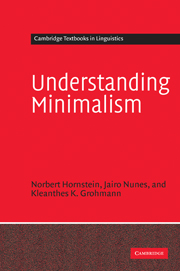Book contents
- Frontmatter
- Contents
- Preface
- List of abbreviations
- 1 The minimalist project
- 2 Some architectural issues in a minimalist setting
- 3 Theta domains
- 4 Case domains
- 5 Movement and minimality effects
- 6 Phrase structure
- 7 Linearization
- 8 Binding Theory
- 9 Feature interpretability and feature checking
- 10 Derivational economy
- Glossary of minimalist definitions
- References
- Language index
- Name index
- Subject index
10 - Derivational economy
Published online by Cambridge University Press: 05 June 2012
- Frontmatter
- Contents
- Preface
- List of abbreviations
- 1 The minimalist project
- 2 Some architectural issues in a minimalist setting
- 3 Theta domains
- 4 Case domains
- 5 Movement and minimality effects
- 6 Phrase structure
- 7 Linearization
- 8 Binding Theory
- 9 Feature interpretability and feature checking
- 10 Derivational economy
- Glossary of minimalist definitions
- References
- Language index
- Name index
- Subject index
Summary
Introduction
All generative approaches to grammar have included conditions limiting movement in various ways. Ross (1967) is an early (and still an outstanding) example of how to constrain movement via locality conditions of various kinds. The minimality idea in chapter 5 that moves must be “the shortest possible” to be licit is a modern descendant of Ross's earlier progeny. This chapter reviews other kinds of rather different restrictions on movement and grammatical relations, in general.
Island conditions and minimality restrictions act to limit the reach of an operation (i.e. a given rule can't relate A and B because they are too distant from one another). The restrictions we'll be examining, by contrast, don't restrict the reach of a rule, but its applicability (i.e. although a given rule could relate A and B if applied, it simply can't apply in the cases considered). For example, we'll contrast movement with other available grammatical options, exploring the idea that movement is permitted just in case these other options aren't. Thus, in contrast to minimality where the locality issues are entirely local (Can I go from here to there without violating minimality?), the considerations laid out in the following require a comparison among alternative derivational options (Is this grammatical option the best among the various ones at my disposal?).
This kind of comparative non-local reasoning has recently become fashionable in a variety of areas. We outline how a version of this intuition has been developed within minimalism.
- Type
- Chapter
- Information
- Understanding Minimalism , pp. 330 - 365Publisher: Cambridge University PressPrint publication year: 2005



